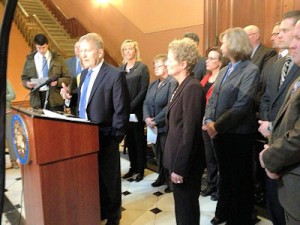Observations and comments about state government by State Representative Robert W. Pritchard.
March 18, 2013
In this issue:
· Gun Control Debate Stalls, New Plan Ignored
· Misleading Investors and Citizens all to Common
· Survey Finds Different Views on Increasing Minimum Wage
· Groups Testify Education in Crisis
· Several Pension Reform Bills Debated, Passed
· Reminder about the Importance of Agriculture
· Participate in my Advisory Council Discussions
Gun Control Debate Stalls, New Plan Ignored
While Speaker Madigan continued to call ridiculous gun control amendments for debate last Wednesday, he refused to allow debate on four bills that would address gun and gang-related violence. The House defeated amendments that would make criminals of anyone who possessed large capacity ammunition feeding devices for guns or failed to deactivate any so called assault weapons.
Meanwhile actual legislation that would address the runaway violence in Chicago by increasing penalties for committing violence with a gun and recruiting gang members, improving mental health reporting, and enhancing conflict-resolution education failed to get even a committee hearing. I am a co-sponsor of this “Protect our Children” package which includes:
· House Bill 3217: increases the minimum sentence for possession of a firearm by a street gang member and requires they serve 85 percent of the jail time upon conviction.
· House Bill 3009: makes it easier to convict someone of recruiting members into a gang. Current laws require proof that recruiters used physical force or coercion to recruit another person into a gang.
· House Bill 1925: seeks better court information so state police can revoke or deny permits to own a gun. The bill provides funding for continuing education of circuit judges and circuit court clerks to improve reporting of individuals with mental health conditions that would potentially disqualify them from holding a FOID card.
· House Bill 1978: mandates school districts to provide instruction and training in violence prevention and conflict resolution as a part of regular classes.
Misleading Investors and Citizens all to Common
The news headlines last week only confirmed what we in Illinois have known for years: when it comes to finances, our public officials use a lot of “wool” to cover our eyes and the facts. The State of Illinois agreed with the U.S. Securities and Exchange Commission (SEC) that it had misled investors about the financial health of its public employee pension systems when it sold bonds from 2005 to 2009.
While announcing the settlement to fraud charges with Illinois, the SEC reported that state officials have taken several steps to improve the situation. The state now uses attorneys devoted to disclosure, expanded exposition in the pension section of bond-sale documents, and established formal disclosure procedures including reviews by the five pension agencies that administer the retirement programs.
Unfortunately, this administration has not admitted to citizens or taken steps to correct its failure to live within budget appropriations for numerous state programs. As a result, Illinois will have over $9 billion of unpaid bills at the end of June. The latest example was reported in my newsletter last week involving the Community Care Program which helps senior citizens live in their homes rather than go to nursing homes.
This is an effective program and our local providers live within state guidelines, but this administration overspends its budget year after year. The Governor’s Office of Management and Budget, in a letter to legislators last week, admitted that it had overspent the appropriations for the Community Care Program by over $317 million since 2010.
As a result, the Governor wants an immediate supplemental appropriation to continue the program and pay some of its back bills. The letter revealed that a big part of the overspending is due to not controlling the number of participants. Next year, the number of participants is expected to be over 20 percent more than four years ago.
The Administration is also encouraging legislators to expand eligibility to the Medicaid program next year. If the Governor is successful, expect even more budget overruns and a higher pile of unpaid bills.
Survey Finds Different Views on Increasing Minimum Wage
You’d expect businesses, many who are struggling in this economy, to object to the Governor’s talk about increasing the minimum wage. A small survey by the Rockford Chamber of Commerce of businesses around Rockford and Belvidere confirmed that suspicion but also gave insight to how businesses might respond to a rise in the minimum wage.
Many said their company or non-profit organization would reduce the number of employees, their work hours, their benefits, or use of summer help. Others said they would reduce their services or programs if wages increased. Some added they would continue to automate their business to reduce the number of workers needed. Those who said they would pass along the increased wage costs to consumers also feared higher product prices could lead to less business and business failure.
Still there were a few respondents to the Rockford Chamber survey who agreed with the Governor’s and President’s recent remarks that higher wages and family incomes could move people off of government welfare and increase consumer spending. Some legislators are willing to pass legislation, despite the negative risks, for such outcomes.
Groups Testify “Education in Crisis”
The process for building a state budget started in earnest last week as agencies and groups began appearing before the five House Appropriation Committees with their program justifications and budget requests. In the Elementary and Secondary Education Committee, we heard that the drain of state resources devoted to education in recent years threatens to derail implementing landmark reforms, hamstring academic opportunities and unravel the basic education needed to prepare students for success in life.
State School Superintendent Chris Koch acknowledged that due to less revenue and increased student needs, two-thirds of school districts are now deficit-spending. Lower property tax receipts and state funding cuts are having a real impact Koch explained. Schools are firing teachers and staff, increasing class sizes, reducing transportation and activities, and requesting shorter school days and 4-day school weeks in an effort to manage the situation.
The financial strain is worse in disadvantaged school districts with little local wealth and large concentrations of low-income and special need students. The State Board of Education is requesting $861 million in additional funding to stop the bleeding and do the essential job of educating the next generation. Given Illinois’ financial situation, there is little chance that funding level will be approved.
I have been challenging the Illinois State Board of Education (ISBE) to give school districts some immediate relief from complying with all the unfunded state mandates. Koch said his agency is giving waivers to outsource drivers’ education, is preparing rules for public comment on allowing more special needs students in regular classes, and is delaying the timeline to hire certified school nurses.
Getting kids to school so they can learn is essential but there are efficiencies that more districts could adopt and the state transportation reimbursement program should encourage that. The governor, on the other hand, proposes to keep all the mandates in place and cut transportation reimbursements to just 20 percent of school district costs.
The Education Appropriation Committee will be considering its practice of prorating general education funds to districts and looking at alternative ways to prorating funds that cut less for poor and special needs districts.
 Several Pension Reform Bills Debated, Passed
Several Pension Reform Bills Debated, Passed
A comprehensive, bi-partisan pension reform bill passed a key House committee on Thursday and is headed to the full House. The plan, sponsored by Representatives Tom Cross (R-Oswego) and Elaine Nekritz (D-Northbrook), is estimated to reduce the $97 billion unfunded pension liability by $29 billion.
House Bill 3411 would limit cost of living adjustments (COLAs), delay the point when COLAs begin, and increases employee pension contributions. The bill also creates a new benefit category which combines a defined benefit with a 401(k) type plan starting in 2014. Opponents of this bill claim it represents a diminishment of benefits and will ultimately be found unconstitutional in a court challenge.
During floor action on Thursday, two of Speaker Madigan’s piecemeal pension proposals cleared the House and could head to the Senate for consideration. House Bill 1166 increases the retirement age for pension system participants on a sliding scale, and House Bill 1154 would limit an employee’s maximum “pensionable” salary at the Social Security wage base (currently $113,700) or the employee’s annual compensation during the 365 days immediately preceding the bill’s effective date, whichever is greater. Last week two Senate pension bills passed out of committee as well.
Reminder about the Importance of Agriculture
 Farmers and high school students studying agriculture filled the capitol last week to discuss the importance of this industry to Illinois. At left, Ken Tyrrell, Sheridan, and Al Dietz, Clare, explained that agriculture employs about 20 percent of the Illinois work force in farming, manufacturing the inputs they use, food processing and manufacturing their raw products into industrial uses. They added that a strong livestock industry in the state helps consume the corn and soybeans. While a lot of the grain is exported as a raw material, its value grows in the economy when the grain is fed to livestock.
Farmers and high school students studying agriculture filled the capitol last week to discuss the importance of this industry to Illinois. At left, Ken Tyrrell, Sheridan, and Al Dietz, Clare, explained that agriculture employs about 20 percent of the Illinois work force in farming, manufacturing the inputs they use, food processing and manufacturing their raw products into industrial uses. They added that a strong livestock industry in the state helps consume the corn and soybeans. While a lot of the grain is exported as a raw material, its value grows in the economy when the grain is fed to livestock.
Hundreds of high school students who study agriculture and participate in the FFA program were also present to help deliver lunches to legislators and their staff, as well as a basket of Illinois made products. I had an opportunity to visit with FFA students from DeKalb High School (shown at right with their advisor), Genoa-Kingston, and Somonauk-Leland-Sandwich FFA Chapter.
Since the FFA was founded in 1928, millions of students have studied agricultural careers, developed leadership and other skills, and grown in personal confidence and responsibility. These students are quick to point out that FFA and agriculture are more than farming. It’s an industry that adds more than $9 billion annually to the state’s economy and offers tens of thousands of jobs each year.
Participate in my Advisory Council Discussions
After this week, the legislature will be on Easter break until April 8. I will be meeting with citizens and my Education and Veterans Councils to share information about pending legislation, the state budget and other issues. If you would like to join in one of these meetings, contact my office.
Bob
District Office 815-748-3494 or E-Mail to bob@pritchardstaterep.com
Click Here To Submit A News Tip Or Story


